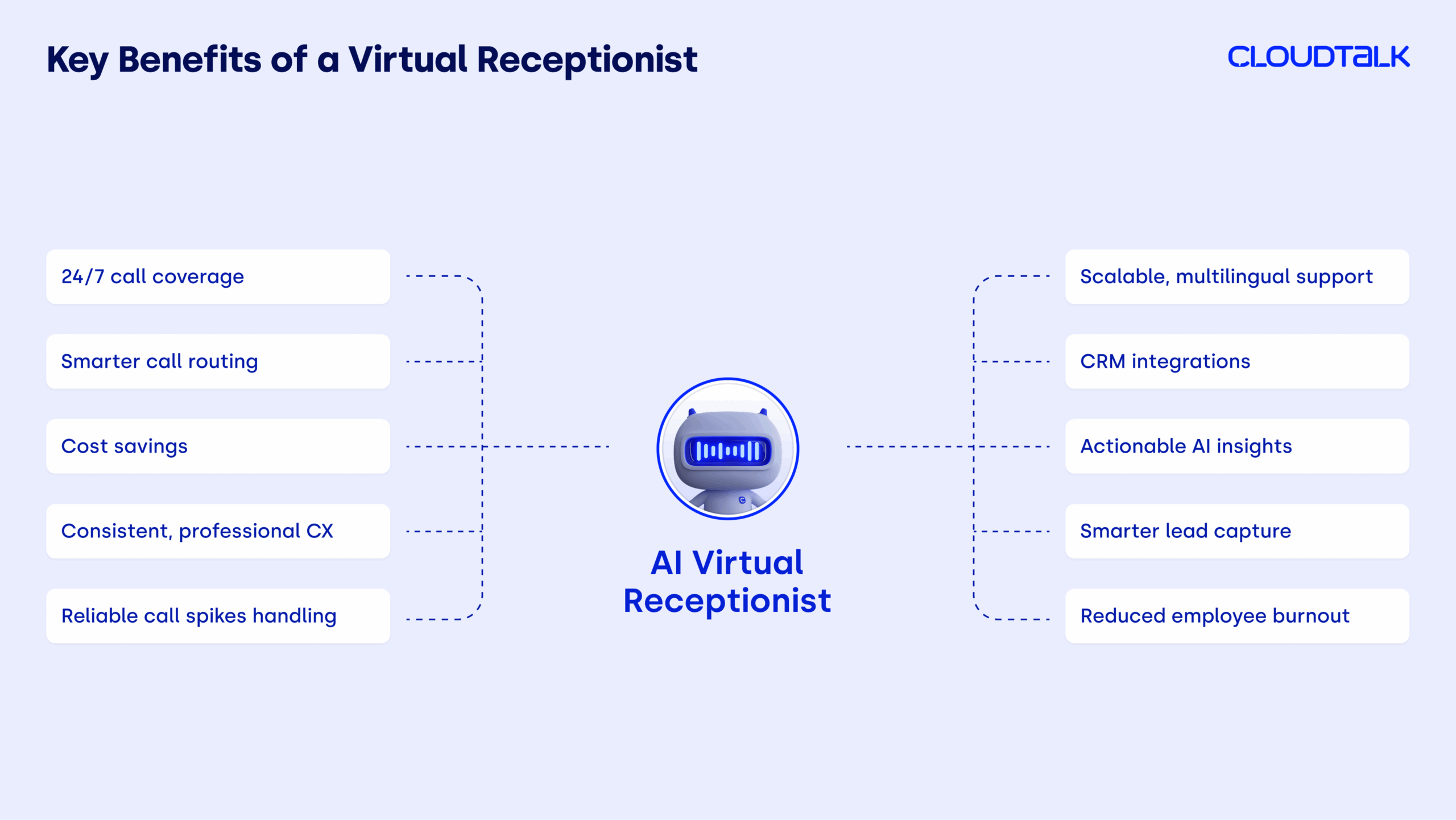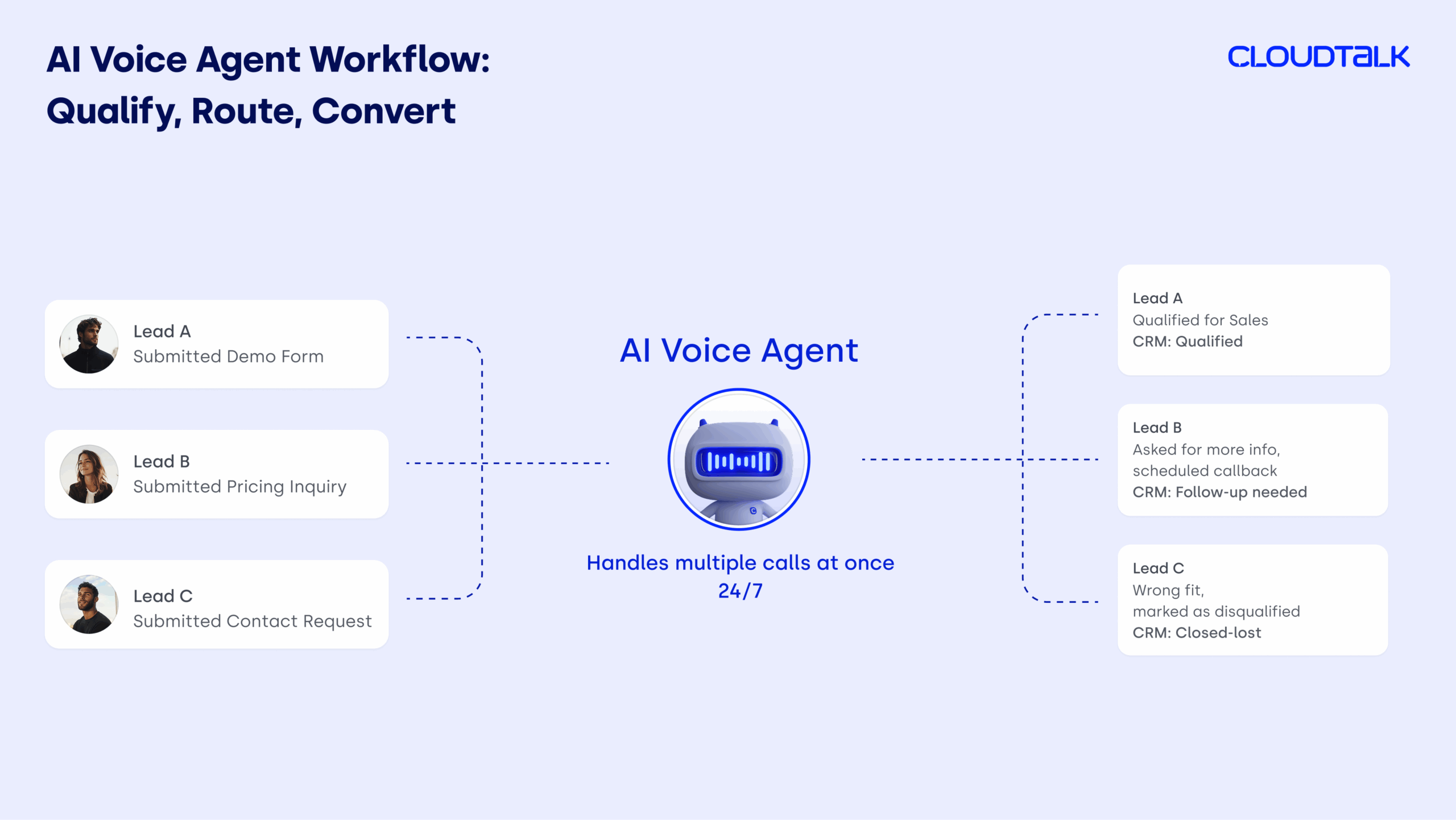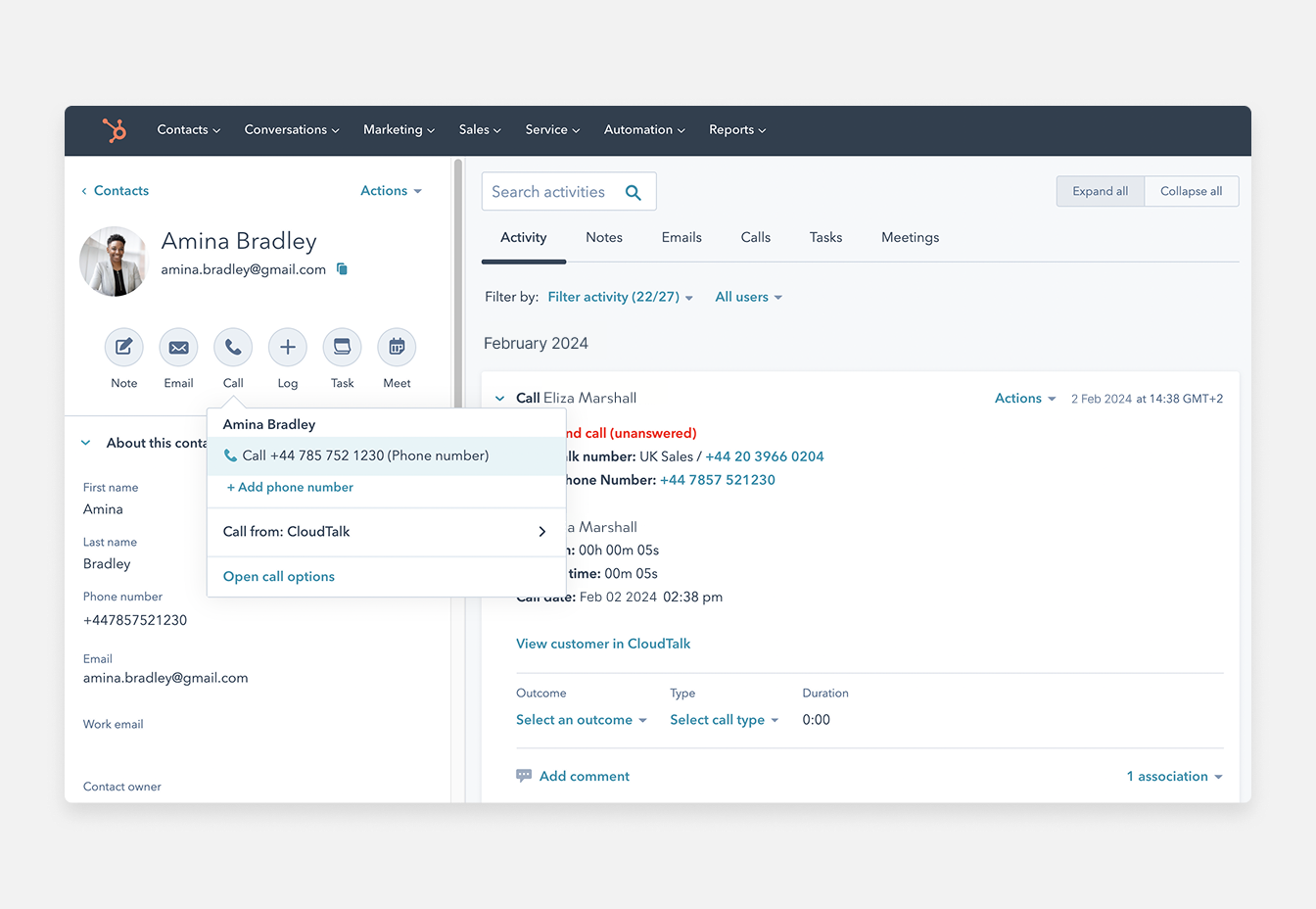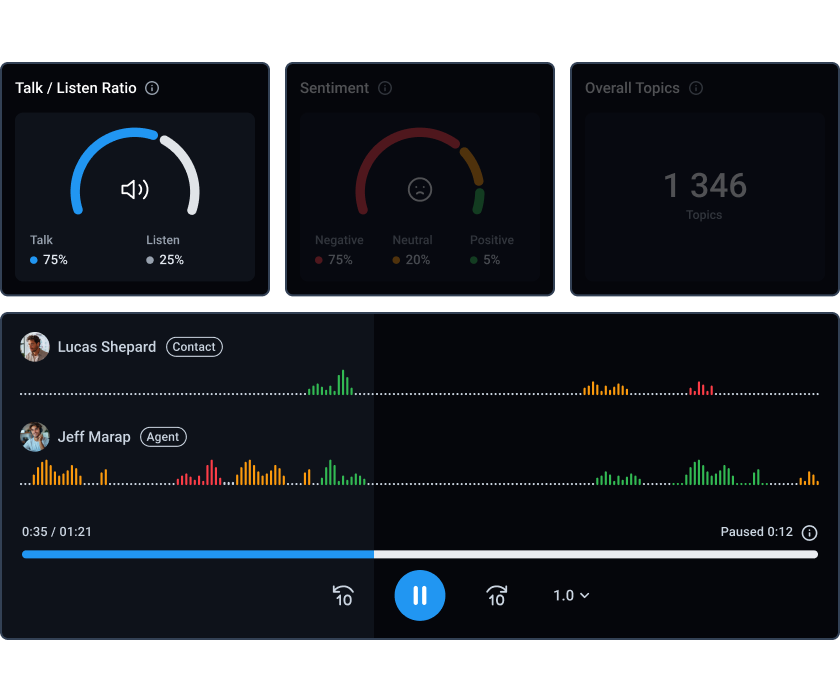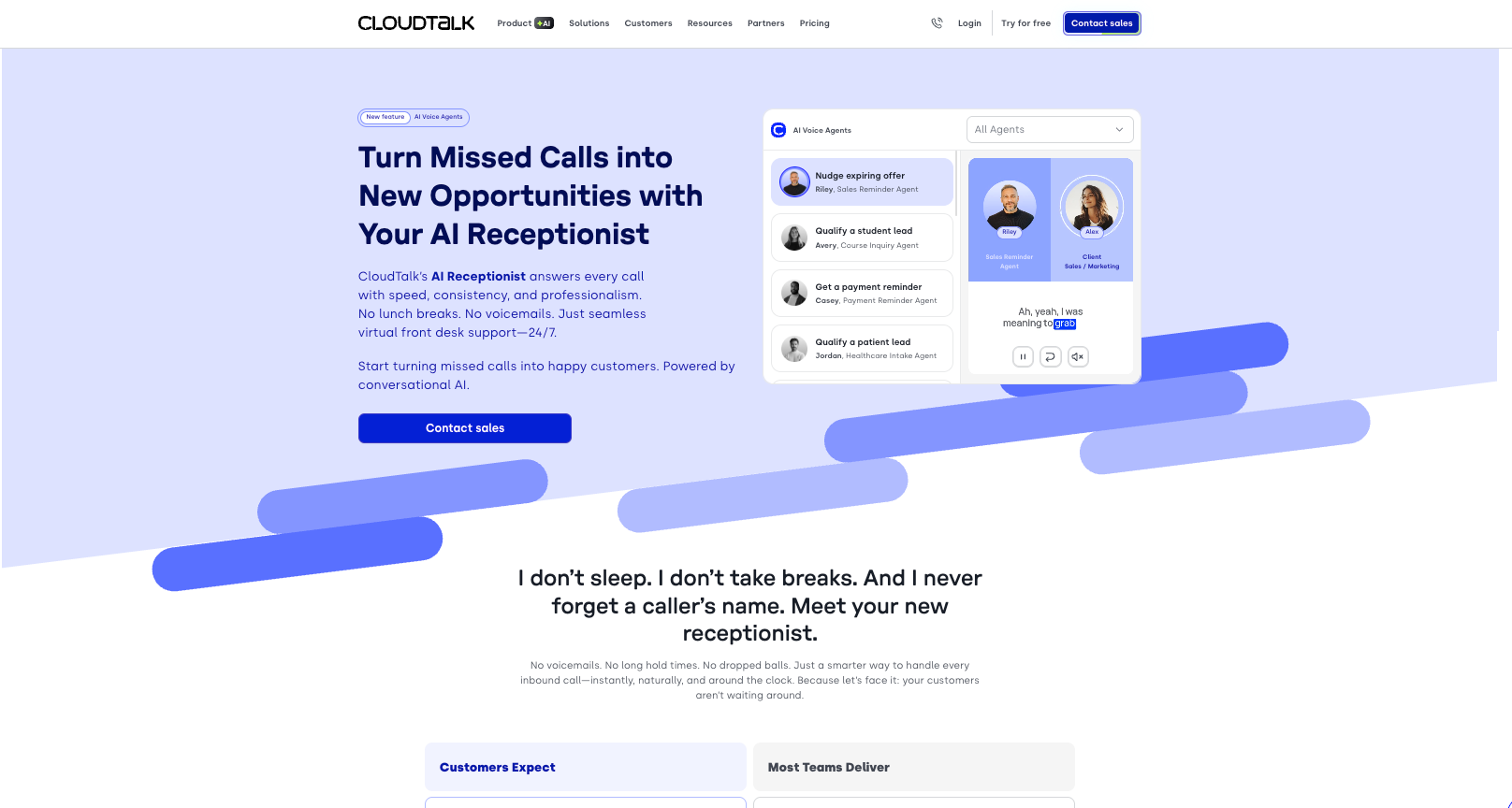10 Benefits of AI Virtual Receptionists for Small Business Growth in 2026
TL;DR:
Virtual receptionists aren’t just about answering phones anymore. In 2026, they combine AI, automation, and integration to protect revenue, improve customer trust, and scale globally. Especially when it comes to small businesses that want to expand to new markets while keeping the costs under check.
The 10 main benefits of virtual receptionists for SMBs are:
-
01
Cost savings compared to hiring full-time staff
-
02
24/7 call coverage that captures every lead, even after hours
-
03
Smarter call routing for faster answers and less hold time
-
04
Consistent, professional customer experience on every call
-
05
Reliable call handling during spikes and peak seasons
-
06
Scalable, multilingual support for global customers
-
07
CRM integrations that keep data synced automatically
-
08
Actionable AI insights from calls, notes, and analytics
-
09
Smarter lead capture and higher conversion rates
-
10
Reduced employee burnout with routine calls offloaded
Your receptionist should protect your revenue, not just answer your phones.
Missed calls cost more than you think. For SMBs, agencies, and fast-growing SaaS or e-commerce teams, every unanswered call risks losing trust and business. In fact, 80% of callers sent to voicemail don’t leave a message¹. Don’t answer straight away, and they’re gone. And so is your revenue.
For small businesses, every call is a high-stakes moment. Unlike enterprises with massive departments, an SMB missing a single call often means losing a lead to a faster competitor.
That’s why more businesses rely on the AI virtual receptionist—or artificial intelligence receptionist. It’s not just call answering anymore, but automation, CRM sync, and global coverage that capture every lead. Platforms like CloudTalk show what’s possible—24/7 availability, smarter routing, and insights that protect revenue.
This guide breaks down the 10 biggest benefits of virtual receptionists relevant to businesses that want to grow in 2026, the real price of missed calls, and the top 3 virtual receptionist providers to consider.
Protect Revenue. Answer Every Call.
What Is a Virtual Receptionist?
A virtual receptionist (often referred to as an AI voice agent) is a service that answers and manages calls for your business using AI and automation. It greets callers, routes them to the right place, and handles routine requests, so your team doesn’t have to.
Here’s what a virtual receptionist can do:
-
Answer calls 24/7, even at night, on weekends, or during holidays.
-
Direct callers quickly, to the right person or department.
-
Handle simple requests like booking appointments or sharing business hours.
-
Capture key caller details like names, numbers, and reasons for calling, all logged automatically.
-
Support multiple languages so customers feel understood wherever they’re calling from.
In short, a virtual receptionist makes sure no call is ever missed and every customer gets a professional experience.
AI vs. Live Answering Services:
When evaluating providers, small businesses often choose AI over human services for two reasons: Speed and Accuracy. While live agents can take 3-5 rings to answer and might miss detail in CRM notes, AI answers on the 1st ring and syncs data 100% accurately every time.
Top 10 Benefits of Using a Virtual Receptionist for Small Business in 2026
Service-heavy industries (like healthcare, law, or real estate) and fast-growing SMBs often share the same struggles: missed leads and high staffing costs. While traditional answering services offer a basic fix, a modern AI virtual receptionist provides a strategic growth engine.
Below, we break down the 10 specific ways AI transforms your phone lines from a cost center into a revenue protector.
10 Best AI Virtual Receptionists
Check out the top 10 AI virtual receptionist providers and choose the best fit for your business.
1. Cost Savings vs. Full-Time Staff
Staffing a front desk is expensive—and still leaves gaps during nights, weekends, and peak hours. A virtual receptionist delivers the same coverage at a fraction of the cost.
How it works:
-
Predictable monthly or per-minute costs replace salaries, benefits, and overtime.
-
Automation absorbs overflow, so you don’t have to hire extra people for spikes.
-
Service scales up or down instantly, without recruitment or training costs.
Bottom line:
A virtual receptionist delivers full coverage at a fraction of the cost. The savings go straight into growth—marketing, product, and talent instead of payroll.
2. 24/7 Call Coverage: Capture Every Call, Every Time
Customers today don’t wait around. Over 60% say fast response times are the most important part of good service². If your phones go unanswered after hours, most won’t try again—they’ll move on to the next option.
That’s why the real damage from missed calls happens after hours when competitors are just one click away. A virtual receptionist keeps your line open 24/7, so every customer is greeted and no opportunity slips through.
How it works:
-
Always-on answering (AI or live reception service) covers nights, weekends, and holidays.
-
Business hours routing redirects calls to voicemail, SMS, or callback flows when your team is offline.
-
Callbacks allow customers to request a return call instead of waiting.
Bottom line:
Every call is answered, even after hours. You capture leads that competitors often win when businesses go silent.
3. Smarter Call Routing
Not every caller needs the same thing. Some are ready to buy, others just want pricing, and some aren’t a fit at all. A virtual receptionist (powered by AI) listens, understands intent, and routes calls, making sure each caller ends up in the right place.
How it works:
-
Demo requests or high-intent leads get qualified and sent straight to sales.
-
Pricing or product questions trigger callbacks or follow-up tasks in your CRM.
-
Wrong-fit contacts are filtered out automatically, so your team doesn’t waste time.
-
FAQs (hours, order status, location) are answered instantly, no agent required.
Bottom line:
Your AI receptionist directs every call to the right place, instantly. Leads are sorted, routed, and logged in real time—so customers get fast answers, sales teams get better opportunities, and support avoids unnecessary noise.
4. Consistent, Professional CX
Your front desk sets the tone for your brand. A virtual receptionist keeps that experience consistent—no rushed greetings, no missed context, just professionalism every time.
How it works:
-
Branded greetings ensure your business sounds polished.
-
Multi-language or location-specific scripts improve accessibility.
-
Reliable call quality even during peak hours.
Bottom line:
The experience stays steady from the first call to the last, and that reliability gains you customer trust.
5. Handling Call Spikes Smoothly
When calls spike suddenly—due to promotions, outages, or seasonal peaks—even the best teams struggle. A virtual receptionist (and AI voice agents) absorbs the surge without cracking.
How it works:
-
AI Voice Agents answer FAQs or deflect repetitive calls during surges.
-
Callback and overflow routing spread demand without increasing wait times.
-
Analytics + dashboards let managers forecast and prepare for spikes.
Bottom line:
Even at peak hours, customers still get through. Service stays reliable, and your staff avoids the stress of overload.
Handle Call Spikes Like a Pro
Learn how to handle Call center call spikes & get 10 proven tips on how to manage high call volume
6. Made for Scale & Global Reach
If your business serves international clients, a single-language receptionist isn’t enough. A virtual receptionist designed for scale offers multilingual support so callers always feel understood and welcomed.
How it works:
-
Greets customers in their preferred language automatically.
-
Offers region-specific menus, hours, and call flows.
-
Builds trust by respecting cultural context in communication.
-
Eliminates friction for global e-commerce, healthcare, or travel businesses.
Whether you’re running a boutique law firm, a local clinic, or a growing e-commerce shop, multilingual AI ensures you never turn away a customer due to a language barrier.
Bottom line:
Multilingual support makes every caller feel understood, which helps build trust and make global expansion smoother.
60+ Languages Supported
7. CRM Integrations & Data Sync
A receptionist that answers calls but leaves you with manual notes isn’t solving the real problem. Virtual receptionists like CloudTalk integrate directly with your CRM and helpdesk systems, so every call feeds into your workflows.
How it works:
-
AI Smart Notes and Call Transcripts sync instantly with candidate or customer records.
-
Triggers workflows (tasks, follow-ups, reminders) without manual effort.
Bottom line:
Forget missed calls, info gaps, or double data entry. Your virtual receptionist makes sure details flow straight into your CRM. This way, teams share the same information, and customers don’t have to repeat themselves.
8. Actionable AI Insights & Analytics
Data is the difference between surviving and scaling. Virtual receptionists powered by AI give you insights into what really happens on calls.
How it works:
-
Automatic Smart Notes summarize every call.
-
Sentiment analysis shows caller mood and satisfaction trends.
-
Keywords and topic extraction highlight recurring issues.
-
Dashboards track call volume, wait times, and outcomes.
Bottom line:
Calls turn into a steady source of insights. You see trends, customer moods, and recurring issues clearly. Managers can use these insights to coach better, forecast, and improve results.
9. Smarter Lead Capture & Higher Conversions
Missed leads are the biggest hidden cost of poor call handling. A virtual receptionist ensures every opportunity is logged, followed up, and moved forward.
How it works:
-
Callbacks reduce drop-offs by offering alternatives to long holds.
-
AI captures caller details and intent instantly.
-
CRM sync ensures follow-ups never fall through the cracks.
-
Automated SMS notifications keep prospects engaged.
Bottom line:
Your AI receptionist helps convert more leads into paying clients, keeping your pipeline full without extra manual effort.
10. Reduce Small Business Burnout: Offload Routine Calls
Your team doesn’t need to spend hours fielding repetitive calls. A virtual receptionist offloads the routine, so your people focus on what matters.
How it works:
-
Handles peak-time and after-hours FAQ calls like hours, location, or booking requests automatically.
-
Routes only complex or high-value calls to agents.
-
Balances workload across teams using smart routing.
Bottom line:
Agents spend their time on the calls that matter.
Reducing repetitive calls helps prevent burnout and protects morale. That means happier teams, stronger CX, and lower recruiting expenses.
The Price of Missed Calls: How AI Virtual Receptionist Saves Revenue
Even the best teams lose money through their phone lines. A virtual receptionist isn’t just someone to answer calls—it’s a safeguard that makes sure no lead, customer, or opportunity slips away.
Without one, the losses add up quickly:
-
Missed leads = missed revenue. Across industries, nearly a quarter of inbound calls (20–25%) go unanswered³. That means opportunities disappear before you even know they existed.
-
Overloaded staff burn out. Burnout costs companies an estimated $322 billion every year in lost productivity (WHO/ILO)⁴. For smaller, fast-growing teams, that drag can be the difference between scaling and stalling.
-
Inconsistent experiences erode trust. Rushed greetings, coverage gaps, or missing multilingual support leave customers doubting your reliability.
-
No data means no improvement. Without call analytics, you can’t see trends, track customer intent, or fix what isn’t working.
A virtual receptionist solves these problems directly—capturing every call, handling routine requests, routing smartly, syncing with your CRM, and delivering analytics you can actually use. It’s not just a helper. It’s an always-on way to protect your revenue.
And once you know what’s at stake, the next question is obvious: which virtual receptionist provider can deliver all this in 2026? Let’s look at the top virtual receptionist platforms businesses are choosing.
Top 3 Virtual Receptionist Providers in 2026
Once you understand the benefits, the next question is obvious: Which virtual receptionist provider is the right fit for your business?
And while there are many different AI virtual receptionist solutions, most fall into one of three categories:
-
01
AI-first platforms built for SMBs and scale
-
02
AI + human hybrid solutions built for professional services
-
03
Enterprise UCaaS platforms with receptionist add-ons
That’s why we’re focusing on CloudTalk, Smith.ai, and Nextiva. Together, they represent the spectrum of options businesses compare today.
Why We Picked These Three?
When evaluating the top virtual receptionist providers in 2026, we focused on one key question:
“Do they actually deliver the core benefits modern businesses need—like 24/7 coverage, call spike management, multilingual support, CRM sync, and AI-driven insights?”
From that lens, three solutions stand out because they cover different business needs while reflecting the main approaches to virtual receptionist services:
-
CloudTalk: Best virtual receptionist software for growing SMBs and scale-ups. Voice-first, AI-powered, global reach, multilingual support, and deep CRM integrations. Perfect for SaaS, e-commerce, healthcare, real estate, and agencies that want to scale without missing a lead. CloudTalk is specifically optimized for SMBs who need to evaluate their performance instantly. It’s also the only tool here that offers enterprise-grade CRM sync for a small-business budget.
-
Smith.ai: One of the best virtual receptionists for law firms, agencies, and service-based SMBs. Combines AI with live agents to handle intake, scheduling, and lead qualification. CloudTalk covers these use cases too, but Smith.ai is often chosen by businesses that still want a strong human touch.
-
Nextiva: A very popular virtual receptionist for enterprises or mid-market orgs looking for a full UCaaS platform. Receptionist features come bundled as part of a broad communications suite, but AI answering isn’t their primary focus.
3 Best AI Virtual Receptionist Providers
| Platform | Who It’s Best For | G2 Rating | Starting Price |
|---|---|---|---|
| CloudTalk | AI-first for SMBs and global scaling | 4.4/5 | $19/user/month for your plan + $350/month for Virtual Receptionist (1,000 mins incl.) |
| Smith.ai | AI + human hybrid for service-heavy industries | 4.9/5 | From $95/month (AI receptionist, 2 calls/day) |
| Nextiva | Enterprise UCaaS with receptionist add-ons | 4.5/5 | Receptionist features included as part of user plans; starting at ~$20–$30/user/month |
Why Trust Our Software Review?
For nearly 10 years, we’ve been helping more than 30,000 professionals with our solutions. Along the way, we’ve worked closely with experts across customer support, sales, and operations—listening to their challenges and following market trends.
To support better software decisions, we’ve reviewed over 200 software tools across industries. In the process, we’ve analyzed 5,500+ verified customer reviews from platforms like G2, Gartner, Capterra, and TrustRadius, plus real discussions on Reddit and Quora.
In the last year alone, we published over 1,000 articles—each one written by humans for humans, with care and a deep understanding of our customers’ needs. The reviews are based on trustworthy data, with one clear goal: to provide reliable insights and answers for you.
Learn how we keep our content integrity and our software review methodology.
1. CloudTalk: The Best Virtual Receptionist for SMBs & Scale
CloudTalk offers the most complete AI-powered virtual receptionist for growing businesses. It combines automation, CRM integration, and multilingual support—making it a true fit for companies that want to scale without missing leads or sacrificing CX.
A quick overview of CloudTalk:
Best for: Growing SMBs and scale-ups in SaaS, e-commerce, healthcare, real estate, and many more.
Starting price: from $19/user/month for the platform + $350/month for virtual receptionist (1,000 minutes/month)
G2 rating: 4.4/5 (1,700+ reviews)
Best features of CloudTalk virtual receptionist:
-
A human-sounding AI voice agent that answers calls 24/7 and handles routine requests at scale
-
A virtual call answering system offering multilingual support for global reach.
-
Native integrations with 100+ CRMs and helpdesk tools, including Salesforce, HubSpot, Zendesk, and more.
-
AI Smart Notes and AI Call Summaries that offer invaluable coaching insight (available with Conversation Intelligence add-on).
-
Call spike handling with callback flows and overflow routing.
-
Your virtual receptionist call flows are fully customizable, so you can use it for outbound calling too.
Where it beats others:
Purpose-built for AI and automation, not a bolt-on. CloudTalk delivers every benefit we outlined above in one system.
AI Smart Notes: One of my favorite features – it auto-transcribes calls and updates HubSpot instantly, saving time and keeping our CRM clean.
CloudTalk’s virtual receptionist also takes care of routine outbound tasks like lead qualification or post-support feedback. Just check out how it works for the most common use cases below.

AI Voice Agents
Sales Reminder
Agent
Client
Sales / Marketing
Course Inquiry
Agent
Client
Education / EdTech
Payment Reminder
Agent
Client
Financial Services
Healthcare Intake
Agent
Client
Healthcare
Insurance Intake
Agent
Client
Insurance
T&C Acceptance
Agent
Client
Legal Services
Legal Intake
Agent
Client
Legal Services
Candidate Feedback
Agent
Client
Recruitment / HR
Applicant Pre-screen
Agent
Client
Recruitment / HR
Action Reminder
Agent
Client
SaaS / Software & Apps
Subscription Renewal
Agent
Client
SaaS / Software & Apps
CX Feedback
Agent
Client
SaaS / Software & Apps
Post-Sales Feedback
Agent
Client
SaaS / Software & Apps
Trial Signup
Qualifier
Client
SaaS / Software & Apps
2. Smith.ai: Hybrid AI + Human Receptionists for Services
Smith.ai is popular with law firms, agencies, and other professional services that still value a human-first receptionist experience but want to add AI support on top. It takes care of routine tasks like intake, appointment scheduling, and basic lead qualification.
A quick overview of Smith.ai:
Best for: Service-heavy SMBs (legal, consulting, marketing agencies).
Starting price: from $95/month for AI receptionist (2 calls a day included = $1.90/call), or from $300/month for Virtual human receptionist (30 calls included)
G2 rating: 4.9/5 (73 reviews)
Best features:
-
AI-assisted call answering with live agents.
-
Appointment scheduling and client intake.
-
Outbound lead qualification and follow-ups.
Where it fits:
Businesses that still want some human receptionist presence alongside automation.
Smith.ai has been a very important part of my business. I needed help with nurturing new leads, completing intake forms, and scheduling discovery calls.
3. Nextiva: UCaaS Receptionist Features for Enterprises
Nextiva positions itself as a unified communications (UCaaS) provider, making it better suited for enterprises or mid-market orgs than SMBs. Receptionist features come bundled into their broader platform (voice, video, messaging).
A quick overview of Nextiva:
Best for: Enterprises and mid-market organizations.
Starting price: Receptionist features included as part of user plans; ~$20–$30/user/month.
G2 rating: 4.5/5 (3,400+ reviews)
Best features:
-
UCaaS suite (voice + video + messaging).
-
Call routing and receptionist console.
-
Enterprise-scale compliance and admin controls.
Where it fits:
Enterprises that want an all-in-one communications suite. But compared to suites like CloudTalk, AI automation and receptionist features are limited.
We were looking for an all-in-one system to combine the multiple and expensive systems we had in place. After some research, Nextiva was definitely the way to go.
Recommended Articles
Even One Flow Protects Revenue
Conclusion: Don’t Let Missed Calls Drain Your Revenue
Missed calls frustrate customers, and, worse, cost you real revenue. In fact, businesses that respond within an hour are 7x more likely to qualify leads⁵ than those that wait longer. Every unanswered call is an opportunity lost to a competitor.
That’s why settling for a basic answering service isn’t enough in 2026. You need a virtual receptionist that combines AI, automation, and integrations to deliver real business impact.
CloudTalk gives you that advantage. With an AI-first Virtual Receptionist built for scale, it does more than just answer calls 24/7. Its benefits help drive your growth:
-
24/7 availability so you never lose a lead.
-
Smarter routing and CRM sync for seamless customer experiences.
-
Global reach with multilingual support that builds trust across markets.
-
Actionable AI insights that turn conversations into strategy.
The businesses that win this year won’t be the ones with the busiest teams—they’ll be the ones with the smartest systems. CloudTalk makes sure you’re one of them.

Don’t Miss Another Call

Sources:
- 01
- 02
- 03
- 04
- 05
